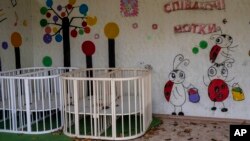On February 16, Russian President Vladimir Putin met with Presidential Commissioner for Children's Rights Maria Lvova-Belova. He commended Lvova-Belova for her work on implementing the state-organized deportation of Ukrainian kids and their adoption by Russians, which, he said, amounts to protecting the rights of the children as “our citizens”:
"There is also a growing number of inquiries from our citizens concerning the adoption of children from the Donetsk and Lugansk republics and the Kherson and Zaporizhzhia regions … The tragedy that is taking place in Donbas also concerns our very small citizens, children. … The Office of the Presidential Commissioner for Children’s Rights has been working hard on this issue and continues this work still."
That is false.
Children from Ukraine’s Donetsk, Lugansk, Kherson and Zaporizhzhia regions are Ukrainian citizens. The Russian authorities have arranged their forcible deportation to Russia and adoption by Russians. That, according the U.S. State Department, constitutes a war crime and an act of genocide as defined by the United Nations, a grave breach of the Fourth Geneva Convention on the protection of civilians.
Russia began systematically taking Ukrainian children to Russia a few days before launching a full-scale invasion of Ukraine on February 24, 2022. It justified doing so by citing the alleged threat of an offensive by the Armed Forces of Ukraine in the country’s eastern Donbas region.
Russian government officials led by Lvova-Belova centrally manage the camps and other institutions to which children from Ukraine have been transported. The United States, European Union and United Kingdom have sanctioned her for her role in the deportations.
Under the Genocide Convention, adopted by the U.N. General Assembly in 1948, genocide includes “[f]orcibly transferring children of the group to another group” (Article II, (e)).
On September 7, 2022, U.N. Assistant Secretary-General for Human Rights Ilze Brands Kehris reported there were credible allegations that unaccompanied Ukrainian children were being forcibly transferred to Russia. She said that Russian authorities had “adopted a simplified procedure to grant Russian citizenship to children without parental care” so that they could be sent, in violation of international law, for adoption by Russian families:
“Under Article 50 of the Fourth Geneva Convention, the Russian Federation is prohibited from changing these children’s personal status, including nationality.”
On February 14, the Conflict Observatory, an American non-governmental organization funded by the U.S. State Department, issued a report titled “Russia’s Systematic Program for the Re-education and Adoption of Ukraine's Children.”
Based on satellite imagery, a six-month archive of documentation, and statements from families on both sides, the report concluded that:
- More than 6,000 Ukrainian children “ages four months to 17 years” were taken to 43 camps “within Russia-occupied Crimea and mainland Russia.”
- At least 32 of the camps (78%) “engaged in systematic re-education efforts that expose children from Ukraine to Russia-centric academic, cultural, patriotic, and/or military education.”
- 20 children from at least two camps that were believed to be orphans were later placed with foster families in Russia.
- Parental consent for a child to attend a camp was in many cases given under pressure from the “occupying forces” and then regularly violated. For example, in approximately 10% of camps, “children’s return to Ukraine was allegedly suspended.”
- In the cases of Crimea and Chechnya, "[c]hildren at the camp were able to handle military equipment, drive trucks, and study firearms."
- All these actions constitute potential violations of the Convention on the Rights of the Child and the Geneva Conventions.
On February 19, U.S. Secretary of State Antony Blinken told CBS News' "Face the Nation" program that Washington had received enough evidence to assert that Russia had committed crimes against humanity in Ukraine, including children being forcibly separated from their families, which international tribunals regard as genocide:
“This practice that, as a parent, is almost impossible to fathom, of literally seizing Ukrainian children, sending them to Russia, sending them to centers, there are about 43 of them that we found. … Separating them from their families and then having them adopted by Russians. This is in and of itself, horrific. It also speaks to the fact that President Putin has been trying from day one to erase Ukraine's identity, to erase its future. That's what's going on, and that too, is a crime against humanity.”
Russia illegally occupied parts of the Donetsk and Luhansk regions in 2014, and parts of the Zaporizhzhia and Kherson regions in 2022. On September 30, 2022, Russia announced it had annexed these four Ukrainian regions.
On October 12, 2022, the U.N. General Assembly adopted a resolution condemning Russia's "illegal so-called referendums in regions within the internationally recognized borders of Ukraine and the attempted illegal annexation” of the four regions of Ukraine.
The assembly declared that Russia’s “attempted illegal annexation” of Ukrainian regions has no validity under international law. The resolution was supported by 143 of the U.N.’s 193 member states, while five voted against it and 35 abstained.





